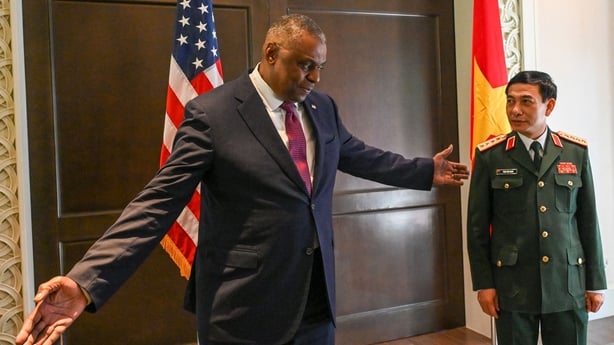China will "not hesitate to start a war" if Taiwan declares independence, its defence minister has warned his US counterpart, in the latest salvo between the countries over the island.
The warning came as Wei Fenghe held his first face-to-face meeting with US Defense Secretary Lloyd Austin on the sidelines of the Shangri-La Dialogue security summit in Singapore.
US-China tension has been soaring over democratic, self-ruled Taiwan, which lives under constant threat of invasion by China.
China views the island as its territory and has vowed to one day seize it, by force if necessary.
Mr Wei warned Mr Austin that "if anyone dares to split Taiwan from China, the Chinese army will definitely not hesitate to start a war no matter the cost", defence ministry spokesman Wu Qian quoted the minister as saying during the meeting.
The Chinese minister vowed that Beijing would "smash to smithereens any 'Taiwan independence' plot and resolutely uphold the unification of the motherland", according to the Chinese defence ministry.
He "stressed that Taiwan is China's Taiwan ... Using Taiwan to contain China will never prevail," the ministry said.

during a bilateral meeting ahead of the Shangri-La Dialogue summit
Mr Austin "reaffirmed the importance of peace and stability across the (Taiwan) Strait, opposition to unilateral changes to the status quo, and called on (China) to refrain from further destabilising actions toward Taiwan," according to the US Department of Defense.
Tensions over Taiwan have escalated, in particular due to increasing Chinese aircraft incursions into the island's air defence identification zone (ADIZ).
US President Joe Biden, during a visit to Japan last month, appeared to break decades of US policy when, in response to a question, he said Washington would defend Taiwan militarily if it is attacked by China.
The White House has since insisted its policy of "strategic ambiguity" over whether or not it would intervene has not changed.
Mr Austin is the latest senior US official to visit Asia as Washington seeks to shift its foreign policy focus back to the region from the Ukraine war.
As well as on Taiwan, China and the US have been locked in a range of other disputes.
They have been at loggerheads over Russia's invasion of Ukraine, with Washington accusing Beijing of providing tacit support for Moscow.
China has called for talks to end the war, but has stopped short of condemning Russia's actions and has repeatedly criticised American arms donations to Ukraine.
China's expansive claims in the South China Sea have also stoked tensions with Washington.
Beijing claims almost all of the resource-rich sea, through which trillions of dollars in shipping trade passes annually, with competing claims from Brunei, Malaysia, the Philippines, Taiwan and Vietnam.
Mr Austin arrived in Singapore late yesterday, and has held a series of meetings with his counterparts.
At a meeting with southeast Asian defence ministers, he spoke about Washington's "strategy in maintaining an open, inclusive and rules-based regional security environment", according to a statement from the Singapore government.
His comments were a veiled reference to countering China's increasing assertiveness in the region.
Mr Austin will deliver a speech at the forum tomorrow, followed by Mr Wei on Sunday.
The three-day summit is taking place for the first time since 2019 after twice being postponed due to the Covid-19 pandemic.

